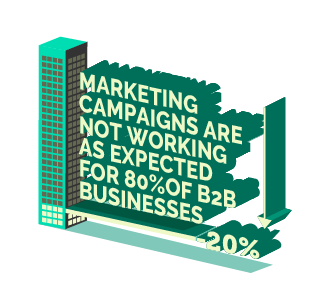Be honest. Are your marketing efforts worth it? Or is your marketing not working?
For many business owners, it seems like marketing is a breeze for other B2B businesses, just not theirs.
We speak to a lot of companies who feel this way. Often they’ve compared themselves with how they think other B2B businesses are faring. But for a number of reasons, these aren’t fair comparisons.
The Profitability Bias

When we consider that marketing campaigns are not working as expected for 80% of B2B businesses. Then it is worth noting the context of those results. For example, of those who completed our B2B business marketing survey, 73.3% were B2B businesses that identified themselves as ‘new’ or ‘non-profitable’.
That means that just over a quarter were profitable. This is unsurprising. Larger, profitable businesses are far more likely to have satisfactory marketing campaigns. This is because they have access to more resources and higher budgets.
It is also worth factoring in positivity bias; companies that are profitable are likely to be much more positive about their marketing efforts than those that are non-profitable, because they have a clear success metric.
Companies that are non-profitable, on the other hand, have to speculate as to the cause of their non-profitability. In many cases, their marketing initiatives are often to blame for lack of profitability, without reasonable cause.
In other words, making comparisons with other B2B businesses without taking into account their size isn’t entirely helpful.
The Secret Ingredient Bias
The second problem with B2B businesses making these competitor comparisons is what we call ‘the secret ingredient bias’.
Picture the following. You’re the new kid on the block. You’re conducting competitor research. While you’re conducting this research, it’s easy to set your sights on whoever is dominating search rankings. These are, after all, the B2B businesses you’re hoping to one day contend with.
But if they’re ranking first consistently across a significant number of keywords, then chances are they’re a reasonably sized company.

As a new or small business, comparing yourself to these behemoth competitors does little else but discourage you.
It’s tempting to think that they are privy to a top-secret marketing strategy that continues to evade you. Whereas the truth of their success is far more likely to be hard graft, time, investment, and ample resources.
Believing that there is a secret to marketing success is a dangerous way of thinking. It can lead to desperate decision-making, buying into marketing fads, and neglecting critical marketing initiatives in favour of searching for the so called “secret ingredient”.
The Transparency Bias

Which brings us to the third problem with many competitor comparisons. Lack of transparency.
When we don’t have all the facts, we jump to conclusions. When we see that a B2B business competitor is successful, we assume that they must have a successful marketing strategy. The two walk hand in hand, right?
Not always.
Behind the scenes, these companies may well have a pre-existing audience from elsewhere. For instance, a personal social media following that they can attribute to their brand.
This is especially common among businesses that have branded themselves around an individual, like Neil Patel, for example.
There are plenty of other reasons why a business might have achieved massive success, besides their marketing strategy.
They might have high-profile industry contacts. Or valuable media relationships from a time before they launched their business. They might even be benefiting from an investor’s connections with other brands, and the partnerships this affords them.
These hidden factors might well be the backbone of the success of these companies. While their competitors continue to believe that some secret marketing strategy is wholly responsible. Thus, they chase their tails in an effort to discover what it is.
For many, it’s an unwillingness to relinquish this assumption that spells disaster for their company. By chasing the unknown, these businesses fail to invest in the now. They overlook the importance of a long-term, consistent strategy in a bid to discover the non-existent (or extremely rare) fast-track to success.
So why is it that so many marketing campaigns are not working as expected?

When we say that 80% of marketing campaigns are not working, what do we really mean?
As we’ve already addressed, it doesn’t mean that the remaining 20% are in on some industry secret. It also doesn’t mean that all 80% are pursuing the wrong strategies.
Experience has shown us that the most common reasons for marketing campaigns not working or failing to meet expectations are as follows:
- Blogs on marketing convey generic, catch-all advice. Which promotes the illusion that marketing is straightforward
- Fads and trends are on a cycle. Which encourages business leaders to believe that there is some secret to marketing success
- Lack of budget, especially in comparison to competitor budgets
- Losing faith in an initiative that requires long-term investment, like SEO
- An ever-growing number of competitors
- Barriers to market entry are more challenging, particularly without a significant budget
- Customers are more aware of when they are being sold to. As a result they are more resistant to selling
- Unreasonably high expectations of marketing outcomes due misleading marketing blogs and personal brands across social media touting sure-fire routes to success (think LinkedIn entrepreneurs who post screenshots of their latest bank statements with six digit figures)
Some of these issues are surmountable. For instance, seeking professional advice, instead of relying on generic advice blogs, solves one of these problems. Being resilient against fads solves another.
But many of these reasons for marketing failure are par for the course. Budgetary constraints will always be a concern. Growing competition is inevitable. And it’s always difficult to lower barriers to market.
In other words, marketing isn’t meant to be easy.

If you’re a new or small business, you’re engaging in an uphill battle and regarding those who have already reached the summit as being in on some elusive secret you’ve yet to find.
The truth is far simpler than that.
Those who’ve reached the summit have simply been climbing for longer. They’re more experienced and more equipped for the climb.
So why are 80% of B2B businesses unhappy with their marketing campaigns?
Because most businesses are still engaged in the steepest part of the climb.
Take into account that 80% of businesses fail within the first year, and you can expect that many of those businesses won’t ever make it to the summit.
The question isn’t why are 80% of B2B businesses unhappy with their marketing; it is how do we achieve marketing success before our resources and motivation are depleted?
Making it to the summit

Once the initial uphill battle is overcome, marketing becomes significantly easier. With the budget and resources of a more established company, experience, and expertise gained from lengthy trial and error, marketing begins to feel like smooth sailing.
Companies at this stage in their journey have established reliable strategies. To stay on course, they need only be adaptable enough to tweak their strategy when the unexpected arises.
But what about those of you who haven’t reached the summit yet? How do you get there?
Firstly, we would advise you not to view satisfaction with your marketing campaign as a success metric. It’s very difficult to measure the success of your marketing initiatives. Especially in the early stages, because it’s highly cumulative.
Think of it like filling up a glass drip by drip. The difference made by each drip is frustratingly small. But someday a single drip will cause the cup to overflow.
More often than not, marketing success snowballs. Once it starts rolling, it grows exponentially. However, it’s hard to predict precisely when this will happen.
Nonetheless, there are some things you can do to help you achieve success sooner rather than later.
Coordination & Planning
As the graph above shows, the vast majority of B2B businesses either describe their marketing plan as ‘ad hoc’ or as not achieving the results they had hoped for.
For many businesses we speak to, the crux of their marketing problems boils down to poor coordination and planning.
Issues with planning and coordination can manifest in countless ways. And often long after the planning phase. As a result, this can make identifying the planning phase as the source of the problem very challenging.
A strategic, meticulously devised plan of action for your marketing will almost always mark the difference between a success and failure.
Process
48% of B2B businesses cite process as an obstacle to growth. Of those, 60% are new businesses. Surprisingly, just over one-third of established and profitable businesses also experience process problems.
Process issues are extremely common among businesses of all sizes and stages of profitability. These issues can be cumulative and invisible. They can manifest most viciously during periods of change or rapid growth, when efficiency is most important.
Overcoming These Obstacles
Not to labour the analogy…but if achieving marketing success is represented by the summit of a climb, then process and planning are essential components. And it’s these components that enable you to make the climb safely, quickly, and without expending all of your resources.
In fact, they’re a crucial part of every B2B business’ journey towards running consistently satisfactory marketing campaigns. Campaigns that deliver success and the expected results.
Whether or not you hope to execute the marketing initiatives in-house, an experienced marketing consultant can help you devise a long-term plan. One that’s easy to understand and follow.
This plan should factor in your processes to ensure that you streamline your business for long-term success. Working with a marketing consultant during the planning phase can save you from making critical mistakes further down the line.
If you’d like help with your marketing, or you think your marketing’s not working how it should, then get in touch to arrange a free, non-obligation chat with Murray Dare today. Or why not head on over to our free-to-download marketing strategy templates page?




